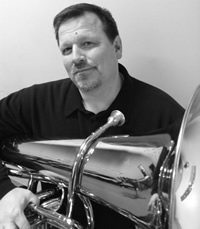Down Home: The Cantata came to life in this World Premiere performance at the Goodson Chapel in the Divinity School of Duke University. Presented by the Triangle Jewish Chorale, with soloists Caroline Oliveira, soprano, Sarah Zielinski, mezzo-soprano, Kyle Berkley, tenor and Harrison L. Bumgardner, baritone and an ensemble of strings, piano and percussion; all conducted by Lorena Guillén. The concert was in memory of Gershon Kedem.
Composer Alejandro Rutty is currently Associate Professor of Music at the University of North Carolina at Greensboro. His compositions have been widely performed by symphony orchestras and ensembles in the US and South America. He is especially known for his development of sound textures using electronic techniques such as text loops and reverb and his skill in the composition of Tango and other South American genres. His latest recording, The Conscious Sleepwalker, was released in 2012 on the Navona label, to high acclaim.
The libretto for Down Home: The Cantata, based on the documentary and book Down Home: Jewish Life in North Carolina, written by Leonard Rogoff, tells the story – or rather, stories – of Jewish immigration and acclamation to life in North Carolina. From an explorer on Roanoke Island in 1585 to the Nobel Prize winners of the Research Triangle today, Jews have contributed to making North Carolina a progressive society.
The text was taken from recordings of interviews with Jewish residents including the Southern Oral History Project. The interview recordings were interwoven with music, and selected passages were molded into choral anthems and solo arias. The over-all effect was a very pleasant listening experience, meaningful and moving.
The cantata begins by telling of those Jews who came from German-speaking lands and eastern European countries seeking the opportunities and freedom they had heard of in glowing terms; they sought to escape the cruel, harsh policies and practices of anti-Semitism in the old country. Men came, worked day in, day out and saved until they could send for wife and children or other family. They came and struggled through hard times and life was better, but the cruel cultural and religious bigotry still lurked behind the workhouse or out in the open.
Sometimes Jewish parents found it expedient to hide their religion. In one of the interviews, this is shared: “I grew up thinking that my family was Christian, but with a bunch of Jewish traditions. On Friday night you light candles. . . It’s in the home.” Some only realized their Jewish heritage as adults.
Social life was a challenge for Jews down home in North Carolina. In one interview we hear this observation: “The odds of falling in love with a Jewish girl – or a Jewish girl falling in love with a Jewish guy – if you’re in Greensboro or Winston-Salem, is one in a hundred.” And In another interview there was this, “We had restricted country clubs here – not restricted, they just didn’t take any Jews.”
Of course there were those subjected to the ridicule, to the cruel wise-cracks and innuendo and worse. “This one guy – he just beat the daylights out of me.” one subject relates. A friendly older boy taught him to defend himself and later, “I tore into him and beat the living hell out of him. From that day to this – ain’t too many people picked on this old man – you know that?” (I wish it would have been different, for that myth always has been suspect.) The real point of the episode was to believe in yourself and “Say you can – and you will.” became a stirring anthem.
There were those Jews who became good peddlers and traders and merchants like H. Cone and his sons, Moses and Ceasar who founded a mill and gave so much back to North Carolina. There were those who sewed into the cultural fabric of this state a love of learning, the ethic of goal- oriented hard work and the importance of family at the center of life.
One episode tells of the English program of accepting German Jewish children, but not their parents. What a cruel philanthropy: rescuing children from the horror of the Holocaust at the price of separation from family. This section made my eyes blurry.
All these stories were told and interwoven with mystical music, for they also brought with them the music of the diaspora to this melting pot: the Hassidic, the Seraphic, even a hint of Klezmer was heard. Rutty’s creative music made the stories live with humor, with determination and with dignity. The arias and anthems stirred the emotions and raised a memorable appreciation for all humanity.
The Triangle Jewish Chorale, the soloists and all the musicians, gave a polished and inspired performance under the guidance of Guillén. This cantata will be repeated at Beth Meyer Synagogue in Raleigh on May 12 and at Temple Emmanuel in Greensboro on May 19. See the sidebar for details.











